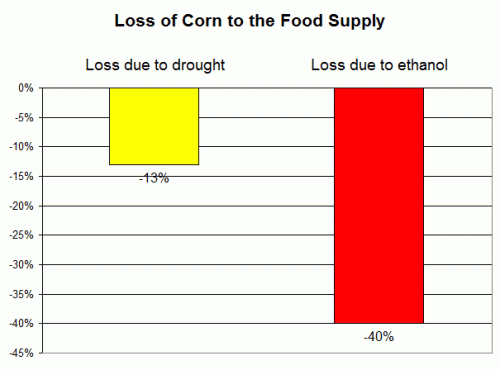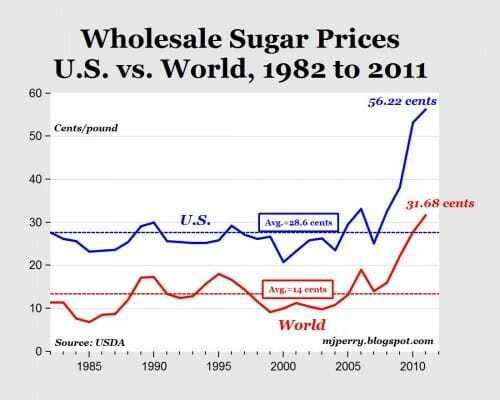Yeah, I know they seem to care so much, but nearly every policy they actively advocate turns out to be a disaster for the poor. Here is a great example:
In May 2002, in the midst of a severe food shortage in sub-Saharan
Africa, the government of Zimbabwe turned away 10,000 tons of corn from
the World Food Program (WFP). The WFP then diverted the food to other
countries, including Zambia, where 2.5 million people were in need. The
Zambian government locked away the corn, banned its distribution, and
stopped another shipment on its way to the country. "Simply because my
people are hungry," President Levy Mwanawasa later said, "is no
justification to give them poison."
The corn came from farms in the United States, where most corn
produced"”and consumed"”comes from seeds that have been engineered to
resist some pests, and thus qualifies as genetically modified.
Throughout the 90s, genetically modified foods were seen as holding
promise for the farmers of Africa, so long as multinationals would
invest in developing superior African crops rather than extend the
technology only to the rich. When Zambia and Zimbabwe turned away food
aid, simmering controversy over the crops themselves brimmed over and
seeped into almost every African state. Cast as toxic to humans,
destructive to the environment, and part of a corporate plot to
immiserate the poor, cutting edge farming technology is most feared
where it is most needed.
This is simply awful, and is driven by progressive politics in Europe that abhor GM food, despite reams of scientific evidence and years of experience that it has no demonstrable health effect. (It is particularly ironic that GM corn should be the target, since corn as we know it is a man-made genetically modified food, albeit by the slow process of cross-breeding. The very existence of corn is one of the great triumphs of pre-Columbian agriculture.)
A key element of progressive politics is to apply western middle class perspectives to Third World problems. In this case, Europeans who are wealthy and well-fed have time and capacity to worry about problems at the margin, such as "might GM corn somehow have a negative health effect on one in a million people?" I believe this concern is absurd even at the margin in western society, but it becomes criminally insane when applied to countries beset with abject poverty and starvation. So we would rather let a million people starve than have one person face some hypothetical health risk?
This same approach can be seen in a myriad of other instances. For example, progressive wish to prevent Nike from building factories in the Third World that hire locals for fifty cents a day. Again, the middle class western perspective: I would never take a job that paid $5 a day for ten hours of labor, so they should not either. But this is in countries where more than half of the population makes less than $1 a day performing subsistence farming for perhaps 12-14 hours a day, and even then risk starvation when the crop fails. The Nike factory represents incredible salvation for many. Do we all hope they will do even better economically in the future? Sure, but you can't step from unskilled subsistence farming for a dollar a day to middle manager at GE all in one step.
And then there is climate. The climate change hysteria, and the associated calls for reductions 80% or higher in CO2 output, is the greatest threat to the world's poor that has existed since the bubonic plague. And yes, I mean the hysteria, not climate change itself. Because if the world gets warmer because of man's CO2 (an iffy proposition), the poor might or might not be worse off. After all, it was during warm periods of the past that the poor thrived, such as the population boom in Europe during the Medieval warm period. But if the world's governments agree to shut down fossil fuel production and reduce the size of economies, over a billion people who are set to emerge from poverty over the next few decades will instead be doomed to remain poor. Progressive environmentalists are not even subtle about what they want -- they are seeking a poorer, lower-tech world. They are selling poverty.
Brendan O'Neil writes in this vein:
In these various scandalous schemes,
we can glimpse the iron fist that lurks within environmentalism's green
velvet glove. "˜Cutting back carbon emissions' is the goal to which
virtually every Western politician, celebrity and youthful activist has
committed himself. Yet for the poorest people around the world,
"˜reducing carbon output' means saying no to machinery and instead
getting your family to do hard physical labour, or it involves
collecting cow dung and burning it in an eco-stove in order to keep
yourself warm.... Carbon-offsetting companies have encouraged Kenyans
to use dung-powered generators and Indians to replace kerosene lamps
with solar-powered lamps, while carbon-offsetting tree-planting
projects in Guatemala, Ecuador and Uganda have reportedly disrupted
local communities' water supplies, led to the eviction of thousands of
villagers from their land, and cheated local people of their promised
income for the upkeep of these Western conscience-salving trees....
Carbon
offsetting is not some cowboy activity, or an aberration, or a
distraction from "˜true environmentalist goals' - rather it expresses
the very essence of environmentalism. In its project of transforming
vast swathes of the developing world into guilt-massaging zones for
comfortable Westerners, where trees are planted or farmers' work is
made tougher and more time-consuming in order to offset the activities
of Americans and Europeans, carbon offsetting perfectly captures both
the narcissistic and anti-development underpinnings of the politics of
environmentalism. Where traditional imperialism conquered poor nations
in order to exploit their labour and resources, today's global
environmentalist consensus is increasingly using the Third World as a
place in which to work out the West's moral hang-ups....
Carbon-offsetting also shines a light on the dangerously anti-development sentiment in environmentalism....
In the near term, countries are already using global warming as an excuse for protectionism, and in particular are cutting off imports from poorer countries that are trying to make some economic progress:
There is little
that angers me more than disingenuous attempts to employ "˜global
warming' as an argument against trade, especially against trade from
the developing world. More often than not, blatant self-interest - that
is, old-fashioned protectionism by another name - is being masked
beneath self-righteous, middle-class gobbledygook.
"Was
Prince Charles' chum Patrick Holden, director of the Soil Association,
expecting the Kenyan High Commissioner to fall to his knees in
gratitude? It rather sounded like it yesterday morning, when the two of
them met in a BBC radio studio.
They
were there to discuss the Soil Association's proposals to discriminate
against the "˜organic food' which is air freighted into this country,
mostly from East Africa. "˜One option was to ban it altogether,'
declared Mr Holden, but instead he and his colleagues had decided that
such food would only be banned if it was "˜not produced ethically' -
whatever that means....
"On the whole it
is a "˜lifestyle choice' limited to middle-class mothers in the
South-east of England who are neurotic enough to believe the
insinuations of the Soil Association that little Henry and Caroline are
more likely to get cancer if mummy doesn't buy organic (at twice the
price).
Now
another largely middle-class neurosis - we are all doomed unless
everybody stops flying! - is being exploited to protect an archaic form
of agriculture which could never feed this country, still less the
world. It
is, at best, an exercise in self-delusion. At worst, it is a way of
using food as the instrument of a deliberate policy of racial
discrimination."
Maxed Out Mamma has more on the global warming excuse for protectionism:
I am genuinely concerned
that environmental concerns are being used as a proxy for protectionist
economic legislation and may have severe consequences. I would like to
discuss this article from a Canadian source about carbon taxation:
Imposing
carbon tariffs on emerging economies with low manufacturing costs and
high greenhouse gas emissions could drive some manufacturers back to
Western countries, according to two economists.
Jeff
Rubin, chief strategist and economist at CIBC World Markets, thinks
such tariffs could emerge quickly. Countries in Europe are already
becoming publicly intolerant of emissions elsewhere and the next
president of the United States is expected to institute a cap on
greenhouse gas emissions alongside the trading of carbon credits.
...Europe is in an extremely
protectionist mood, and I believe one of the reasons for the
non-scientifically based focus on carbon is that it serves as a
justification for tariffs. If the next president does institute carbon
tariffs, the result will have a real impact on world trade.
I
believe that many politicians are being deeply dishonest about their
"environmental" concerns. I also believe that instituting a carbon
tariff will cause Asian growth to slow remarkably and further
destabilize the world economy. The rise in food prices is very
dangerous because it has an impact on the ability of emerging market
countries to support consumption increases necessary to rebalance
trade. If you add to the situation by doing something like this, you
could recreate the conditions which caused the Great Depression.



